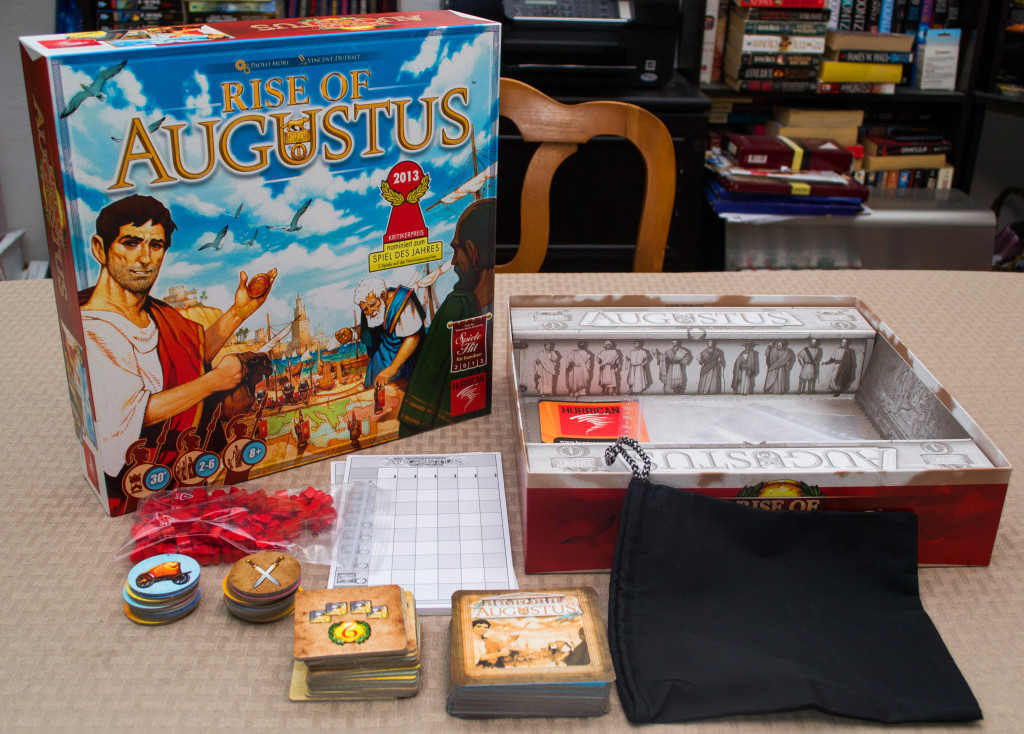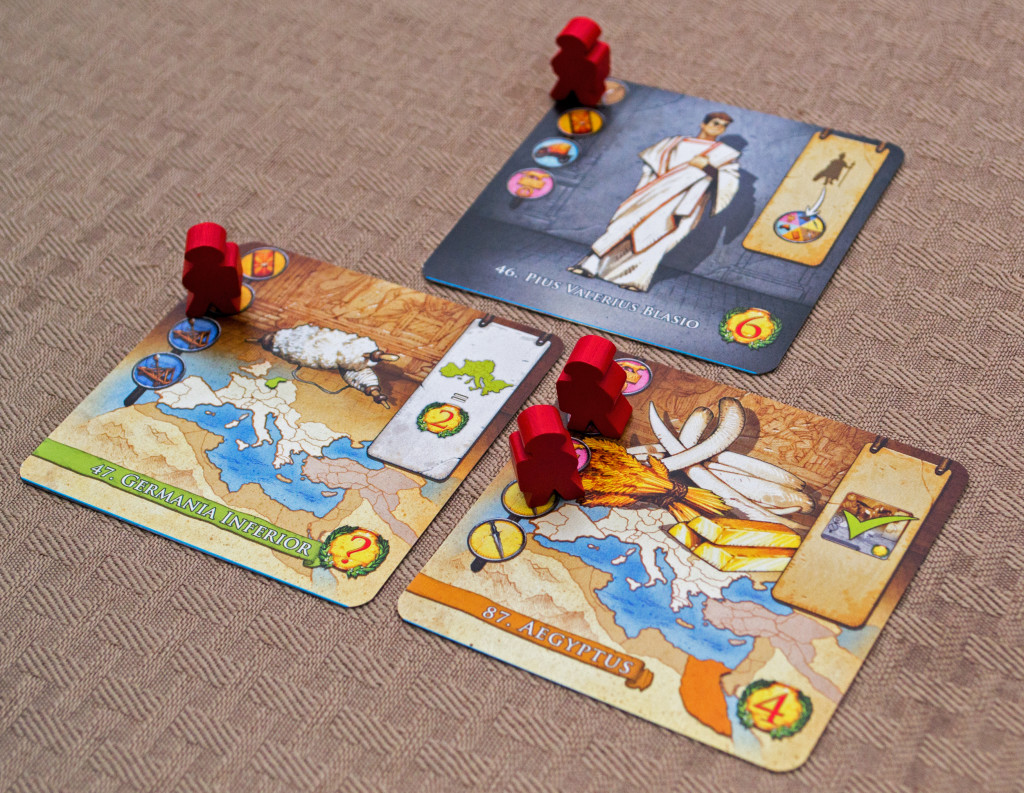“Rise of Augustus”, put simply, is “Bingo” pumped full of steroids. Like traditional “Bingo”, you’ll be placing markers (legions) onto your cards’ individual squares as symbols are called out. True the time period, these cards represent objectives to conquer and senators to sway. Unlike traditional “Bingo”, the game doesn’t end when someone’s card fills up. Further, most cards have some sort of special ability that comes into effect when they are completed. Sounds simple enough, and you’d be right to think so…though you’ll still need to think a little if you plan to claim the title of “Consul”.
Components
Objective Cards – These represent your “Bingo” cards, which each list various symbols/legion types (double swords, shields, chariots, etc.) as well as various powers and/or victory points.
Legions – These represent your “Bingo” markers. Players will place these meeples onto their cards as symbols/legion types are called out.
Mobilisation Tokens & Cloth Bag – These represent your “Bingo” numbers. Players will draw these from the cloth bag and call out the token’s listed symbol/legion type appropriately.
Rewards – Players can claim reward cards throughout the game as certain achievement goals are met.
Scorepad – A thing you use to keep score. Totally revolutionary component.
Setup & Gameplay
The rewards are set out in a row in the center of the table, along with five objectives from the shuffled deck. Each player starts the game with three objectives and seven legions of their chosen color. Players can do the former in one of two ways: 1. deal each player three random objectives OR 2. deal each player six random cards, with each player choosing three and discarding the rest. The oldest player begins as the town crier.
The game is broken up into rounds, though I use that term loosely as round lengths can vary. On a particular round, the following will occur:
1. The town crier will draw a token from the bag and state what it is aloud. All players will then place one legion onto one of their objective cards (the space must match the token’s contents). The legion can come from their stock or one that might already be on an objective card. If a joker is drawn, all mobilisation tokens are put back into the bag and the role of town crier moves clockwise (players get to use the joker as a wild token).
2. This continues until an objective is completed, in which case the player(s) announce “AVE CESAR”. If more than one player does this, they’ll resolve their cards using the numbers listed on said cards in ascending order. To resolve a card, they’ll get back their legions, carry out any possible power listed on it, move the card to their score pile, and choose a new one from the five available in the center of the table. Optionally, players can claim a reward card (some reward card types can be claimed only once per player).
The game ends if a player has seven controlled objectives at the end of a round. Players then total points from their rewards, objectives, and powers to get a grand total. Whoever has the most, wins!
The above doesn’t cover all of the rules found in the manual, but should give you an idea as to how the game is played. For more information, you can view the rulebook here:
http://www.hurricangames.com/datapdf/device/augustus_rules_us.pdf
The Review
Let’s make no mistake, “Rise of Augustus” does share a few similarities with “Bingo”…though I’d like to emphasize the word, “few”. The calling out of legion types and assigning meeples to cards is really the beginning and the end of the comparison. “Rise of Augustus” goes way beyond that simple cause and effect mechanic and introduces the familiar concept of choice. Some reward cards, for example, reward players for completing three objectives of the same color. This by itself will make players consider which cards to take from the stock after completing one, as well as where to put a meeple when a particular legion type is announced. Some may opt to concentrate on the victory points and hope that rewards fall into their lap while others might revolve their strategy around powers and reward cards. You can’t do that in plain old “Bingo”.
The game itself is fairly fast-paced, though your mileage may vary. Some gamers like to throw caution to the wind and just play on instinct while others will scrutinize every possible combination laid out to them. It’s possible to do the latter on every turn as something is usually bound to happen, whether it be someone assigning a meeple to one of their cards or actually completing one. This can slow down the game significantly, especially if you’re playing with more than three players. This isn’t a complaint mind you, just a warning that the thirty minute game time listed on the box is subject to change. Luckily, there aren’t THAT many reward cards to worry about, though the ones that are present are fairly significant to your final score.
All in all, “Rise of Augustus” is a pretty fun game that takes traditional “Bingo” to a whole new level. There’s not much to complain about honestly as the components and art are either on or above par. It’s pretty easy to teach and can support up to six players…a bonus for larger gamer families who struggle to find something that they can all play and agree upon. It doesn’t do anything overly new or revolutionary, but it does the job and then some.
Final Verdict: 8/10
—


